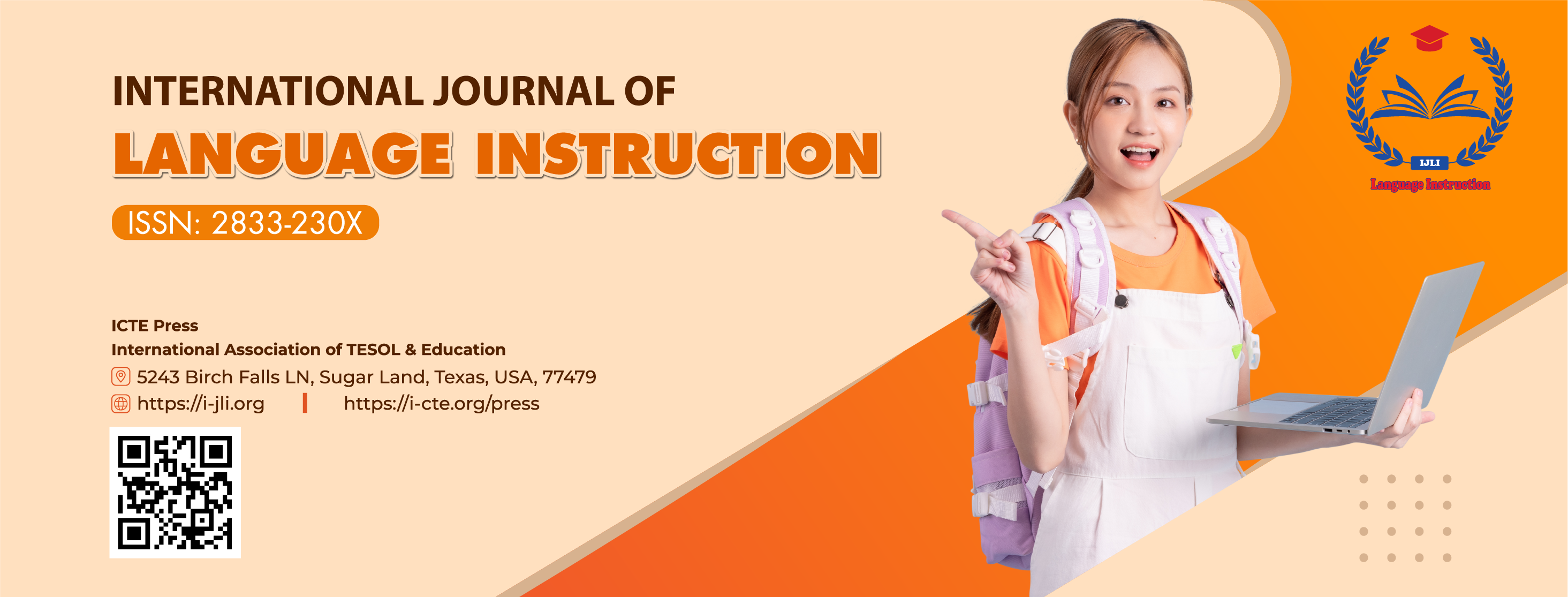Factors Affecting Learner Autonomy in EMI Studying of English-Major Students at some Economics Universities in Hanoi, Vietnam
DOI:
https://doi.org/10.54855/ijli.24333Keywords:
learner autonomy, EMI learning, English-major studentsAbstract
This paper aims to synthesize and analyze factors affecting learner autonomy in EMI learning and proposes effective solutions to eliminate existing issues related to learner autonomy. Employing a quantitative method, the sample for this study consisted of 224 Business English majors enrolled in the top three economics universities in Hanoi, Vietnam, including National Economics University (NEU), Foreign Trade University (FTU), and Thuongmai University during the academic year 2023-2024. The findings showed that some factors such as motivation, attitude, learning strategies, and English proficiency have a significant impact on learner autonomy in EMI learning, especially motivation, which has the strongest positive influence. Teachers, teaching methods, and learning materials motivate and develop students' learning autonomy. Moreover, the findings also revealed that learning culture might have the least influence on how students control their learning. From these findings, students can recognize which factors actively support their learning autonomy in EMI learning or likely hinder their understanding. These findings recommended that students, teachers, and universities implement specific solutions for nurturing and developing learner autonomy in EMI classrooms and university learning environments.
References
Ablard, K. & Lipschultz, R. (1998). Self-regulated learning in high-achieving students: Relations to advanced reasoning, achievement goals, and gender. Journal of Educational Psychology, 90(2), 94-101.
Alonazi, S. M. (2017). The role of teachers in promoting learner autonomy in secondary schools in Saudi Arabia. English Language Teaching, 10(7), 183. https://doi.org/10.5539/elt.v10n7p183
Aprianto, E., Purwati, O., & Anam, S. (2020). Multimedia-Assisted Learning in a Flipped Classroom: A case study of autonomous learning on EFL university students. International Journal of Emerging Technologies in Learning/International Journal: Emerging Technologies in Learning, 15(24), 114. https://doi.org/10.3991/ijet.v15i24.14017
Benson, P. (2003). Learner autonomy in the classroom. In D. Nunan (Ed.), Practical English language teaching (pp. 289-308). New York: Mcgraw Hill.
Benson, P., & Voller, P. (1997). Autonomy and independence in language learning. Routledge.
Benson, P., Grabe, W., & Stoller, F. L. (2001). Teaching and researching autonomy in language learning. Pearson Education.
Blin, F. (2002). ICT and Language Learning: a European Perspective. Angela Chambers and Graham Davies (eds). Swets & Zeitlinger Publishers, Lisse, 2001 ISBN 90 265 1809 9, 90 265 1810 2 (pbk). ReCALL, 14(1), 187–190. https://doi.org/10.1017/s0958344002211519
Brandisauskiene, A., Buksnyte-Marmiene, L., Cesnaviciene, J., & Jarasiunaite-Fedosejeva, G. (2023). The relationship between teacher’s Autonomy-Supportive behavior and learning strategies applied by students: the role of teacher support and equity. SAGE Open, 13(2), 3–12. https://doi.org/10.1177/21582440231181384
Camilleri, G., Languages, E. C. F. M., & Europe, C. O. (1999). L’autonomie de l’apprenant : La perspective de l’enseignant. Council of Europe.
Chan, M. (2015). Language Learner Autonomy and Learning Contract: A case study of language majors of a university in Hong Kong. Open Journal of Modern Linguistics/Open Journal of Modern Linguistics, 05(02), 147–180. https://doi.org/10.4236/ojml.2015.52013
Chen, H. (2015). The correlations between learner autonomy and the effective factors in
college English learning in China. International Review of Social Sciences and Humanities, 8(2), 70-84.
Chik, A., & Breidbach, S. (2014). ‘Facebook Me’ within a Global Community of Learners of English: Technologizing Learner Autonomy. In Palgrave Macmillan UK eBooks (pp. 100–118). https://doi.org/10.1057/9781137290243_6
Da Silva, A. L. L. (2021). Comparing teacher autonomy in different models of educational governance. Nordic Journal of Studies in Educational Policy, 8(2), 103–118. https://doi.org/10.1080/20020317.2021.1965372
Dafei, D. (2007). An Exploration of the Relationship Between Learner Autonomy and English Proficiency, Asian EFL Journal, 24(4): 24-34.
Dang, T. T. (2012). Learner autonomy: A synthesis of theory and practice. The Internet Journal of Language, Culture and Society, 35, 52–67
Dearden, J. (2014). English as a Medium of Instruction—A Growing Global Phenomenon: Phase 1. Going Global 2014, Interim Report, Oxford: Department of Education, University of Oxford.
Dickinson, L. (1992). Learner autonomy: Learner training language learning. Dublin: Authentic
Dickinson, L. (1995). Autonomy and motivation a literature review. System, 23(2), 165–174. https://doi.org/10.1016/0346-251x(95)00005-5
Ding, F., & Stapleton, P. (2016). Walking like a toddler: Students' autonomy development in English during cross-border transitions. System, 59, 12-28. https://doi.org/10.1016/j.system.2016.04.003
Dinh, T. H. T. (2017). An overview of research on foreign language learning autonomy in Vietnam. VNU Journal of Foreign Studies, 33 (5), 123-130.
Doiz, A., Lasagabaster, D. and Sierra, J. M. (2011) ‘CLIL and motivation: The effect of individual and contextual variables’, The Language Learning Journal, 42(2), 209–224.
Dörnyei, Z. & Taguichi, T. (2010). Questionnaires in second language research: Construction, administration, and processing. New York: Routledge.
Duong, T. M. (2015). A Portfolio-Based learner autonomy development model in an EFL writing course (Doctoral dissertation). Thailand: Suranaree University of Technology.
Duong, T. M., & Seepho, S. (2013). EFL teachers’ perceptions of promoting learner autonomy in a Thai EFL context. Paper presented at CULI’s International seminar 2013, Bangkok, Thailand. Retrieved from http://www.culi.chula.ac.th.
Duong, T. M., & Seepho, S. (2014). Promoting learner autonomy: A qualitative study on EFL teachers’ perceptions and their teaching practices. Proceedings of the International Conference: DRAL 2 / ILA 2014, held at King Mongkut’s Institute of Technology Thonburi, Bangkok, Thailand (pp. 129-137). Bangkok: KMITT.
Evans, S., & Morrison, B. (2011). Meeting the challenges of English-medium higher education: The first-year experience in Hong Kong. English for Specific Purposes, 30(3), 198–208. https://doi.org/10.1016/j.esp.2011.01.001
Evans, S., & Morrison, B. (2016). Adjusting to higher education in Hong Kong: The influence of school medium of instruction. International Journal of Bilingual Education and Bilingualism, 21(8), 1016-1029.
Getie, A. S. (2020). Factors affecting the attitudes of students towards learning English as a foreign language. Cogent Education, 7(1), 21-24. https://doi.org/10.1080/2331186x.2020.1738184
Gremmo, M., & Riley, P. (1995). Autonomy, self-direction and self access in language teaching and learning: The history of an idea. System, 23(2), 151–164. https://doi.org/10.1016/0346-251x(95)00002-2
Holec, H. (1981). Autonomy and foreign language learning. Oxford: Pergamon Press. First published 1979, Council of Europe.
Hunt, J., Gow, L., & Barnes, P. (1989). Learner self-evaluation and assessment - A tool for autonomy in the language learning classroom. In V. Bickley (Ed.), Language Teaching and Learning Styles Within and Across Cultures (pp. 207-217). Hong Kong: Institute of Language in Education, Education Department.
Jiang, A. L., & Zhang, L. J. 2019. Chinese students’ perceptions of English learning affordances and their agency in an English-medium instruction classroom context. Language and Education, 33(4), 322–339.
Jiang, A. L., Zhang, L. J., & May, S. 2019. Implementing English-medium instruction (EMI) in China: teachers’ practices and perceptions, and students’ learning motivation and needs. International Journal of Bilingual Education and Bilingualism, 22(2), 107–119.
Jing, N. Q. (2016). On cultivation of autonomous learning competence in college English listening teaching. Sino-US English Teaching, 13(11), 842-846. https://doi.org/10.17265/1539-8072/2016.11.002
Little, D. (1991). Learner autonomy 1: Definitions, issues, and problems. Dublin: Authentik.
Macaro, E., Curle, S., Pun, J., An, J., & Dearden, J. (2017). A systematic review of English medium instruction in higher education. Language Teaching, 51(1), 36–76. https://doi.org/10.1017/s0261444817000350
MacBain, W., & Dickinson, L. (1987). Self-Instruction in language learning. Language, 64(3), 650. https://doi.org/10.2307/414557
McDevitt, B. (1997). Learner autonomy and the need for learner training. Language Learning Journal, 16(1), 34–39. https://doi.org/10.1080/09571739785200251
Ngo, T. C. T, & Doan, L. A. T. (2023). EFL Students' Strategies for Learning Academic Vocabulary with Mobile Phones at Van Lang University in Vietnam. International Journal of Language Instruction, 2(4), 11-18. https://doi.org/10.54855/ijli.23242
Nguyen, T. T. H. (2023). EFL Teachers’ Perspectives toward the Use of ChatGPT in Writing Classes: A Case Study at Van Lang University. International Journal of Language Instruction, 2(3), 1-47. https://doi.org/10.54855/ijli.23231
Oxford, R. 1990. Language learning strategies: What every teacher should know. University of Alabama. Boston. Heinle & Heinle publications.
Pham, M. T., Nguyen, D. N. Q., Nguyen, T. K. C., Nguyen, H. N. M., Hoang, T. a. T., & Pham, V. P. H. (2022). The reality of English presentation skills of English-majored students in Vietnam. International Journal of TESOL & Education, 2(2), 27–46. https://doi.org/10.54855/ijte.22222
Ruiz-Madrid, N., and M. Sanz-Gil. 2007. Integration of ICT in language learning. In Pedagogical reflections on learning languages in instructed settings, ed. E. Usó-Juan and N. Ruiz-Madrid, 62-77. Newcastle: Cambridge Scholars Publishing.
Samuels, J. J. (1970). Impingements on teacher autonomy. Urban Education -SAGE Social Science Collections, 5, 152-171.
Shen, B., McCaughtry, N., Martin, J., & Fahlman, M. (2009). Effects of teacher autonomy support and students’ autonomous motivation on learning in physical education. Research Quarterly for Exercise and Sport, 80(1), 44–53. https://doi.org/10.1080/02701367.2009.10599528
Stefanou, C. R., Perencevich, K. C., DiCintio, M., & Turner, J. C. (2004). Supporting Autonomy in the classroom: Ways teachers encourage student decision making and ownership. Educational Psychologist :/Educational Psychologist, 39(2), 97–110. https://doi.org/10.1207/s15326985ep3902_2
Tran, T. B. T., & Vuong, T. K. (2022). Factors affecting learner autonomy in tertiary level English learning: a study at Van Lang University. International Journal of TESOL & Education, 3(1), 1–18. https://doi.org/10.54855/ijte.23311
Tran, T. Q., & Duong, T. M. (2018). EFL learners’ perceptions of factors influencing learner autonomy development. Kasetsart Journal of Social Sciences, 41(1), 194-199. https://doi.org/10.1016/j.kjss.2018.02.009
Tran, T. T. (2013). Is the learning approach of students from the Confucian heritage culture problematic? Educational Research for Policy and Practice, 12(1), 57–65. https://doi.org/10.1007/s10671-012-9131-3
Tran. T. Q., (2018). The roles of technology in promoting English-majored students’ learner autonomy: A Critical Look at HUTECH Context. Proceedings of Conference on Technology and Science 2018 at Ho Chi Minh City University of Technology (pp.344-348). Ho Chi Minh City: Science and Technology Publishing House.
Tran. T. Q., & Vo. D. Q. (2019). Tertiary English majors' perceptions of the importance of learner autonomy and autonomous language learning strategy use. Proceedings of the International conference: Autonomy and motivation for language learning in the interconnected world at Ho Chi Minh City University of Technology and Education (pp.102-113). Ho Chi Minh City: Vietnam National University – Ho Chi Minh Press.
Ushioda, E. (2007). Motivation, autonomy and sociocultural theory. In P. Benson (Ed.), Learner autonomy 8: Insider perspectives on autonomy in language learning and teaching (pp. 5-24).
Wenden, A. L. (1991). Learner strategies for learner autonomy. Englewood Cliffs, NJ: Prentice-Hall
Zaqiri, L. (2015). The influence of foreign language anxiety on learner autonomy. In B. Xhafferri, M. Waldispühl, B. Eriksson-Hotz and G. Xhaferri (Eds), Promoting learner autonomy in high education, International Conference at South East European University in Tetovo (pp. 133-146).
Zhang, L.X. & Li X.X. (2004). A comparative study on learner autonomy between Chinese students and West European students. Foreign Language World, 4, 15-23.
Downloads
Published
Issue
Section
License
Copyright (c) 2024 Nguyen Thi Hong Hanh, Ho Thi Ngoc, Do Thi My Duyen, Pham Thi Thanh Thuong

This work is licensed under a Creative Commons Attribution 4.0 International License.
The copyright of all articles published in the International Journal of Language Instruction (ijli) remains with the Authors, i.e. Authors retain full ownership of their article. Permitted third-party reuse of the open access articles is defined by the applicable Creative Commons (CC) end-user license which is accepted by the Authors upon submission of their paper. All articles in the ijli are published under the CC BY-NC 4.0 license, meaning that end users can freely share an article (i.e. copy and redistribute the material in any medium or format) and adapt it (i.e. remix, transform and build upon the material) on the condition that proper attribution is given (i.e. appropriate credit, a link to the applicable license and an indication if any changes were made; all in such a way that does not suggest that the licensor endorses the user or the use) and the material is only used for non-commercial purposes.
Authors are able to enter into separate, additional contractual arrangements for the non-exclusive distribution of the journal's published version of the work (e.g., post it to an institutional repository, in a journal or publish it in a book), with an acknowledgment of its initial publication in this journal.











